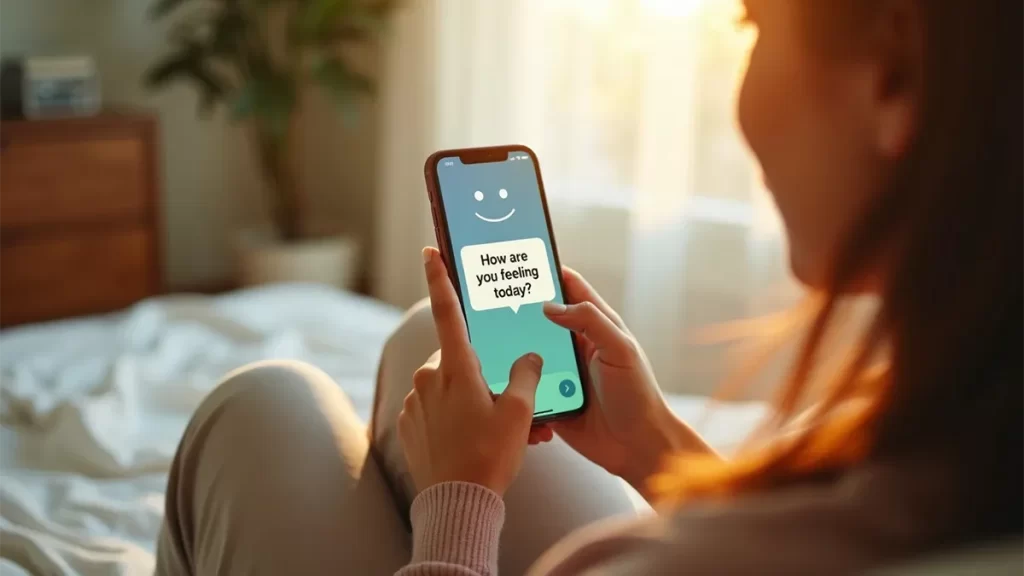AI for Well Being: Apps That Support Emotional Health
AI for Emotional Health offers practical support for managing emotional ups and downs in today’s fast-paced world. Whether juggling school to work or life, emotional stress can often feel overwhelming.
Imagine having tools in your pocket to guide you through tough moments. These tools provide support whenever you need them.
With AI in your pocket, you gain access to mood tracking, relaxation techniques, and exercises designed to enhance emotional resilience.
These tools are designed to complement, not replace, professional mental health care.
These apps serve as real-time companions, offering personalized assistance for emotional balance. But they are more than just tools for individuals—they also provide valuable insights for healthcare providers.
How AI Supports Emotional Well-Being
AI wellness tools provide personalized suggestions for managing emotions. Apps like Wysa and Woebot offer guided mindfulness exercises, mood tracking, and emotional journaling to promote resilience.
These tools are more than simple apps—they use patterns to learn and adapt. For instance, if stress peaks during Mondays, the app might suggest pre-emptive exercises the evening before.
“AI wellness tools provide practical, real-time support for managing emotions effectively.”
Disclaimer: AI apps complement mental health care but do not replace professional medical advice or treatment. Consult a qualified professional for personalized support.
Insights for Healthcare Providers
AI wellness apps offer healthcare providers valuable insights into patient emotions over time. Tools like Moodpath allow therapists to track emotional trends and enhance session planning.
For example, a therapist could review a patient’s weekly emotional data before a session, ensuring they start the conversation with a clearer understanding of recent challenges or improvements.
“AI tools bridge the gap between sessions, giving therapists real-time insights to optimize care plans.”
Core Features of AI Wellness Apps
AI-powered mental wellness apps offer several key features that make them versatile and impactful:
- Mood Tracking: Allows users to monitor their emotional highs and lows, helping both individuals and healthcare providers understand patterns over time.
- Mindfulness Exercises: Apps like Calm and Headspace guide users through relaxation and meditation practices to reduce stress and promote emotional stability.
- 24/7 Availability: Unlike traditional therapy, these tools are accessible any time of the day, offering flexibility and instant support.
- Personalized Tools: Tailored suggestions and exercises help address specific emotional challenges effectively.
Challenges in Using AI for Wellness
Despite their benefits, AI-powered apps face several challenges. These include:
- Privacy Concerns: AI apps collect sensitive data, and ensuring its secure storage and handling is crucial to maintain user trust.
- Lack of Human Empathy: While AI provides real-time support, it cannot replicate the empathy and nuanced understanding of a human therapist.
- Data Accuracy: AI tools may overlook subtle emotional cues, such as body language or tone, that are crucial for comprehensive mental health assessments.
“While AI is a powerful tool, it must work alongside human care to achieve the best outcomes in mental wellness.”
Future of AI in Mental Wellness
The future of AI in mental wellness is filled with potential. As these tools become more advanced, they will likely integrate deeper personalization, enabling them to anticipate user needs with even greater precision.
For healthcare providers, AI advancements will provide more accurate data, helping to refine and enhance therapeutic strategies.
“The integration of AI into mental wellness marks a promising future for accessible and effective emotional health support.”
Conclusion
AI-powered tools are revolutionizing mental wellness by providing practical, accessible, and real-time support for individuals navigating emotional challenges. These tools empower users to manage stress, track emotions, and improve their overall well-being while complementing professional care.
For healthcare providers, AI tools bridge the gap between sessions by offering valuable insights into emotional patterns and trends. This allows therapists to tailor their approach and enhance the effectiveness of their care plans.
Disclaimer: AI tools are designed to complement, not replace, professional mental health services. Always seek the advice of a qualified professional for personalized care and support.
“By integrating technology with human care, the future of mental wellness becomes more accessible, effective, and inclusive for all.”
-

 Best Picks10 months ago
Best Picks10 months agoDriving Insurance: Get the Best Car Coverage Without Overpaying
-

 Best Rewards3 months ago
Best Rewards3 months agoBest rewards credit cards in 2025 for everyday use
-

 Personal Growth & Mindset1 year ago
Personal Growth & Mindset1 year agoTed Lasso Effect: 5 Goal-Setting Secrets You Must Know
-

 Career & Success1 year ago
Career & Success1 year ago30 Key Strategies for Growth: Mindset, Productivity & Wellness
-

 Personal Growth & Mindset1 year ago
Personal Growth & Mindset1 year agoMachado de Assis: This Viral TikTok Explains Why You Need to Read ‘The Posthumous Memoirs of Brás Cubas’ Now
-

 Career & Success12 months ago
Career & Success12 months agoChallenges of Not Having Goals: 5 tips to help you get started












